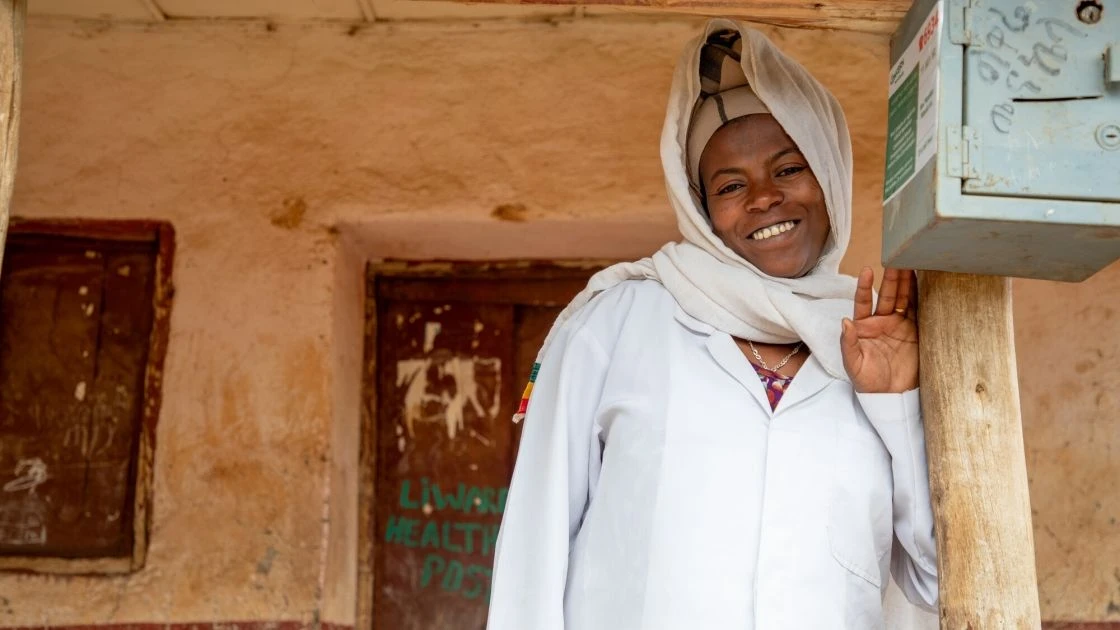Where We Work
Ethiopia
Concern has been programming in Ethiopia for over 50 years, when it responded to severe drought in 1973.
Read More
People living in the Amhara and Somali regions have experienced four consecutive failed rainy seasons. That combined with subsequent flooding, conflict and inflation has led to emergency and crisis levels of hunger, with a high risk of malnutrition and death for the most vulnerable pregnant and breast-feeding women, and children under five years old.
The Emergency Lifesaving Health and Nutrition Response project from Concern is working to reduce serious illness and death from malnutrition by strengthening health care systems and increasing mother and child access to care, particularly for pregnant and breastfeeding women and children under five. This is in conjunction with promoting best practices to fathers and mothers for early childhood nutrition, improving water and sanitation, providing seeds and tools for home gardens to grow nutritious food, and cash transfers in some areas.
“Communities in Amhara and Somali have had to deal with repeated crisis, with very little chance to recover from one crisis to another. By providing this support we’ve been able to remove some of the stress and provide skills and resources that hopefully will prevent them from having to make drastic decisions the next time they face a crisis,” said Austin Kennan, Concern country director in Ethiopia.
“Malnutrition rates and ill-health are currently a chronic challenge, and this program truly has been lifesaving. Given the fragility of the targeted communities, humanitarian needs will continue into the coming years, thus a sustainable approach is needed now more than ever.”
Taimy Belay is a health worker in nutrition and healthcare for mothers and children at a Health Post in Amhara in the north of the country. There was a high rate of malnutrition in her area, but she notes that following Concern’s intervention and the support of local leaders, there have been significant improvements in her community in the areas of nutrition education and maternal health.
“In mother-to-mother and father-to father-groups, we teach the community about nutrition. Before they did not have the practical knowledge on how to feed their babies with nutritious items. The mothers are now in a better position of understanding how to feed their babies and how to look after themselves during pregnancy and post birth. The mother-to-mother and father-to-father groups are working great and are helping to save the lives of many mothers and children as well,” said Taimy.
156 health workers received coaching and refresher training in community-based management of acute malnutrition, including early detection, case management, and referral. Strengthening of the existing health system to increase the numbers of people being treated for acute malnutrition helped reach just under 60,000 people, among them 5,533 children.
Access to clean drinking water is severely restricted in the areas where Concern ran this program, leading to disease outbreaks such as diarrhea and malaria, which contribute to malnutrition. Concern and its partners are rehabilitating several wells to improve the quality of water, along with the rehabilitation of water and sanitation facilities at seven health facilities, and hygiene and sanitation promotion. Concern is also working with local women affairs offices to initiate producing sanitary pads locally to ensure sustainable access in the future.
Asmaru lives with her husband and 11-month-old daughter, Filagot having previously graduated from the department of building electric and installation at the Technical and Vocational school. She meets her mother-to-mother group twice a month and says it has greatly improved her knowledge about how to feed her own baby and look after her own health.
“In earlier times, pregnant women would not go to the health center if they were experiencing pain and even bleeding but now, we teach the mothers when we gather for coffee, we tell them that they must go to the health center especially when they see any bleeding going on. Through this process, we educate our community that pregnant women need additional care and protection and that follow up must be done at the health center,” said Asmaru.
Sisay is a farmer and merchant and is married with four children. He took part in gender training sessions run through the father-to-father sessions. He says it has brought about positive changes in his marriage, with a greater understanding of shared responsibilities and taking on domestic chores, mutual decision-making on family matters, and a newfound respect and care for his wife's well-being. The provision of various vegetable seedling and training has also helped make his children’s meals more nutritious and improve his family’s health overall.
Sisay hopes the program can be extended to other communities where children and mothers are suffering because of different gaps in health and nutrition.
“My wish for the future can be categorized in two ways as follows. One is for my family. My goal is to see my family healthy and happy. The other part is I don’t want to keep all of this knowledge to myself, but I want to transfer it to those who don’t know about it because it is important to spread these skills and knowledge to others so that we can change the future together.”
Concern has been programming in Ethiopia for over 50 years, when it responded to the severe drought in 1973. Currently, Concern is implementing programs in eight zones in Somali, Amhara, and Tigray regions.
If you would like to speak to a member of our team about any aspect of our work, please get in touch with us using the details below.

Vice President of Communications